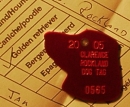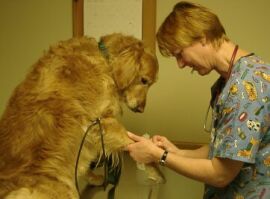 Canaan Pets
Canaan Pets 
If you love your pet, make sure you have annual check-ups and vaccinations.

Click for lost/found animals!
![]()

Have you picked up
your 2005 dog license?
They are now available.
More...
But watch out for the yappers and crappers. They do enforce the bylaws if your pet causes complaints.
We love our pets and we want to help each other to keep them healthy and happy, so
send in your paws for the cause!
Dog / Walk Alerts:
Please! Pick up after your animals... dogs and cats.
![]() Canaan Road (The name may have to be changed to Dog Poop Lane): Just 'cause we live
in the country doesn't mean we don't have to stoop and scoop.
Canaan Road (The name may have to be changed to Dog Poop Lane): Just 'cause we live
in the country doesn't mean we don't have to stoop and scoop.
![]() Blue
Jay - Cardinal Cresent Forest Hill I & II
Blue
Jay - Cardinal Cresent Forest Hill I & II
Hey neighbour! Why don't you pick up after your dog? If you're gonna walk it, bring a plastic bag along.
3.6 billion pounds of dog waste/year is produced in the United States alone! This is equal to 800 football fields, one foot high. Canada isn't very far (up the) behind!
How to pick up after your pet
What your dog knows
![]()
Animal headlines
Cold weather tips for pet owners
Choosing and raising a new pup
Keep your pets cool in hot weather
What happens when cat lover gets dog?
Is Your Cat Safe From Distemper?
Man uses GPS to map dog doo
Cold weather tips for pet owners
"Cold temperatures and wind chill not only affect you, but they also affect your pet," said Daniela Roque, spokesperson for the Toronto Humane Society. "When bundling up to go outside this weekend, remember that your pet will also need some extra care."
Some cold weather tips include:
If your dog is sensitive to cold because of age, illness or breed type, take him outdoors
only to relieve himself. After trips outside, check and clean your dog's feet. Sharp ice can cut the pads of paws,
and ingestion of salt and antifreeze can make your pet sick.
Keep your cat indoors. In cold weather, outdoor cats sometimes crawl into a car's
warm engine and get injured by the fan belt. Before starting a car, honk the horn, open the hood of the car, or
bang loudly on the hood to frighten away any animals sleeping there.
![]() Back to top
Back to top
It’s a dog’s life ![]() (Courtesy MSNBC)
(Courtesy MSNBC)
Choosing and raising a new pup
A dog is said to be a man’s best friend. It brings you entertainment, companionship, loyalty, and safety.
But which “Fido” is right for you? In ‘The Good Life: Your Dog’s First Year,’ Matthew Margolis and Mordecai Siegal
tell you where to look and what to expect when choosing a new puppy. Click here.
![]() Back to top
Back to top
Have you checked out our birding
page?
The dog days of summer ![]() (Courtesy MSNBC)
(Courtesy MSNBC)
Keeping your pets cool in hot weather
Summertime is officially here and while we’ll all be enjoying outside activities there are special safety
concerns when it comes to your four-footed friends. “Today” pet expert Warren Eckstein has some advice on how to
keep your pets cool in hot weather.
HEATSTROKE
This is the most serious and dangerous thing to worry about with your pet in the summer.
Here are the symptoms:
- Excessive panting
- Vomiting/diarrhea
- Elevated temperature
- Hot, dry skin
- Pale lips and gums
- Collapse and coma
Pets rely on panting and sweating to maintain their normal body temperatures but cats and dogs only have efficient sweat glands on the pads of their feet. So, even if you don’t feel overheated under the conditions you’re in your pet may not be feeling too good.
Also, pets with pushed-in faces, like pugs, are more susceptible to heatstroke because they can’t cool themselves down with panting as efficiently, so be careful.
Younger and older pets are also more prone to heatstroke because their cooling systems are not running at peak efficiency.
The best way to treat heatstroke, of course, is to prevent it from happening in the first place.
SOME DO’S AND DON’TS
Never keep your pet in an unattended car
Even if the temperature is moderate outside and the windows are open, cars can heat up like ovens. Never keep
you pet closed up in a pen or kennel without shade, adequate ventilation or water.
Shade is a must
If you leave your pet outside while you go to work, remember to make sure there is always a shady place for
them to rest. The sun moves through the yard all day, there may be lots of shade when you leave and no where to
hide in the afternoon.
Always have lots of water available for your cat or dog to drink in the hot weather.
Freeze the water — again, if you are leaving your pet for the day, warren suggests freezing water in the bowl so
they’ll have cool water to drink throughout the day.
Don’t shave
Shaving your dog’s hair too short, rather than cooling them off, actually robs them of their natural sun block
— yes, they can be burned.
If your pet develops symptoms of heat stroke anyway, here’s how you can help:
- Take the pet to a cool place
- Apply cool water
- If you can, put the pet in front of a fan to speed up the cooling process
- Gently massage your pet’s legs and body
- If your pet is conscious, let him/her drink small amounts of water and wash its mouth out with cool water
- Get them to a vet
Other backyard hazards besides the sun
Barbecues — keep the dogs away from the hot grill — one vigorous wag, the grill goes over, and its bad news
for everyone.
Pools, lakes, ponds — most people assume dogs and cats know how to swim... not true. You need to make sure your
pet can swim, so watch them in the beginning. If they have a hard time, you can get them a life preserver.
Make sure you know what’s in your backyard what could be hazardous. Some common plants to avoid are: avocado, azalea, bird of paradise, cyclamen, daffodil, dieffenbachia, fruit and nut trees (apple, peach, almond, cherry, apricot), hibiscus, holly, hydrangea, lily of the valley, morning glory, nightshade, philodendron, rhododendron, rhubarb, schefflera, tobacco, tomato, eggplant, mushroom, and potato. Also, make sure you check any pesticides or fertilizers before you use them, and keep your pets out of toxic areas.
Dogs on the beach
Again shade is the thing. Always think about providing a shady area. Don’t take them, unless you can do that.
And bring plenty of fresh water on the beach both for your dog to drink and to rinse off with.
Dogs in the car
Letting your dog stick her head out the window and let her ears flap in the breeze is not a good idea. Debris
from the road can fly up and get them in the eyes, nose or mouth. And there’s always the risk that they’ll jump
or fall out.
Exercising your pet
The first rule of thumb, of course, is common sense. Try to exercise with your pet either early in the morning
or after the sun goes down.
They get overheated way before you do, check on them often. They often keep going to keep up with you, so be careful,
it’s hard to tell when they’re tired. Always have water available for you and your pet in hot weather.
Don’t let your dog stand on hot pavement; also, keep in mind, your pet is much closer to the hot ground than you
are, thus his body can heat up more quickly and his paws can burn.
You can soak them with water before you exercise to keep them cool — this is especially important for long-haired
or heavy coated dogs. Spritzing with water is a good idea but don’t let it give you a false sense of security.
![]() Back to top
Back to top
Pet peeves - What happens when a cat lover begrudgingly
gets a dog?
The lowest point, so far, in my three-month experience of dog ownership came one miserable, rainy night
at 11 — when you get a dog, you realize your life has become a series of lousy late nights.
![]() Back to top
Back to top
Other resources:
PetPlanet.com celebrates the rise in prominence and stature that pets have gained in society and
features expert pet advice, pet travel info., a database of local pet service providers, classified ads, online
chats and message boards, and the Pet Safe Network.
Chagnon's Outdoor World! This is an American site, but it offers a lot of good ideas on dog caring products, pet and bird supplies, even what to do with various nuisance animals and insects.
Aggressive Dogs: Biting
My dog is biting people. What should I do?
Click here.
Animals in the news
Pet news 'n tips...
Click here.
All about rabies
Fast facts...
Click here.
Lost & Found
If you have lost or found an animal,
Click here.
Is Your Cat Safe From Distemper?
[Canada Newswire] A recent outbreak of Panleukopenia, or feline distemper, caused the deaths of about 45 cats at animal shelters in Hamilton and London. The Ontario Veterinary Medical Association urges cat owners to ensure their pets are vaccinated against the virus.
Panleukopenia is a highly contagious virus disease that is spread from cat to cat by direct contact. The virus can be transmitted through contact with blood and other body fluids, or via inanimate objects, like food dishes and cages. People can unwittingly transmit the virus through their clothing or hands.
Symptoms of the disease include depression, loss of appetite, fever, vomiting, lethargy and dehydration. In advanced cases, the virus can cause death within hours. As the symptoms are varied, any sick cat should be brought to a veterinarian for diagnosis.
Kittens, ill cats and indoor cats that have not received regular booster shots are most susceptible to distemper.
The mortality rate for young kittens can be as high as 75 per cent. Other cats may succumb to the virus at a rate
of 50 per cent.
How can cat owners ensure their feline companions are protected from distemper?
- 1. Ensure your cat receives regular physical examinations from a veterinarian
- 2. Ensure that all vaccinations and boosters are up-to-date.
- 3. In regions experiencing distemper outbreaks, cat owners should keep their pets indoors and avoid any contact with unfamiliar cats that may be carrying the virus.
Cat owners interested in learning more about feline distemper should consult their veterinarian.
For those considering adopting a cat, the Ontario Veterinary Medical Association has a free publication, Welcome to the Family: A Cat Owners' Handbook. The handbook contains information about a variety of topics, including nutrition, vaccinations, physical examinations and behaviour. To obtain a copy of the brochure, contact your OVMA-member veterinarian, or visit the "Pet Owners" section of the OVMA web site (www.ovma.org) for an on-line version of the publication.
The Ontario Veterinary Medical Association advances, develops and promotes the veterinary profession in Ontario.
The association has more than 1,600 member veterinarians and veterinary students. OVMA provides consumer information
about animal health care and veterinary issues via its web site at www.ovma.org.
![]() Back to top
Back to top
Man uses GPS to map dog doo
A Colorado man has found a more down- to-earth use for satellite-tracking devices than stopping drug smugglers
or pinpointing military targets: locating dog droppings. Click for more. Clarence-Rockland Veterinary Hospital
![]() Back to top
Back to top

Doctors Erik & Donna Petersen
2935 Laurier Street, Rockland, Ontario
(613) 446-7266
